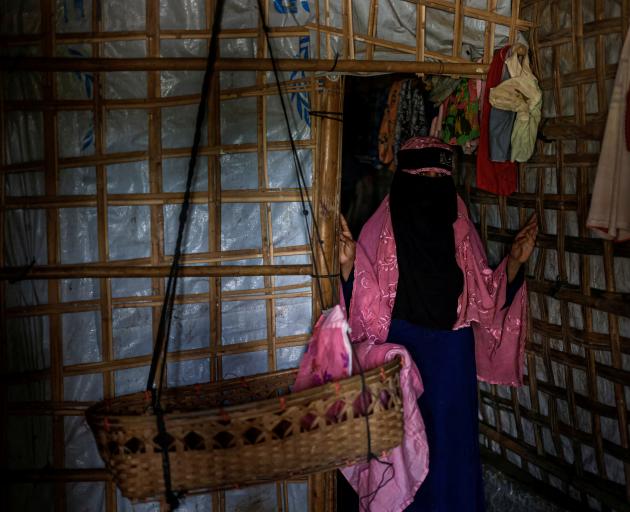Lifestyle
Schools for Rohingya Refugee Children Close Amid Funding Crisis

In Cox’s Bazar, Bangladesh, the education of over 227,500 Rohingya children is in jeopardy as schools close due to severe funding shortages. As the situation unfolds, families fear that the closure of learning facilities will lead to increased child marriages and a generation without education. The humanitarian crisis follows the mass displacement of Rohingya people from Myanmar, with ongoing violence exacerbating the dire conditions in the world’s largest refugee settlement.
The United Nations High Commissioner for Refugees (UNHCR) reports that Bangladesh is home to approximately 1.2 million Rohingya refugees, half of whom are children. On August 25, 2023, the world marked the eighth anniversary of the Rohingya exodus, which saw over 700,000 people fleeing a brutal military crackdown in Myanmar described by UN investigators as “ethnic cleansing.” The urgent need for educational services has become more pressing as funding has dwindled.
UNHCR’s interim representative in Bangladesh, Juliette Murekeyisoni, stated, “This community has already lost everything and are now facing a severe funding shortfall that threatens their survival.” The organization requires approximately $256 million to support the Rohingya this year, yet has only secured commitments for about 38% of that amount. Globally, the UNHCR anticipates receiving just one-third of the $10.6 billion necessary to assist a growing number of displaced individuals.
UNICEF, responsible for many of the learning centers, suspended operations in June at over 4,500 schools, leaving many children without education and teachers without work. Classes resumed in July for older students, but many classrooms remain locked and deserted. “Now the kids just play in the mud or rain. They’re forgetting everything they once learned,” said Naser Khan, a Rohingya teacher.
The impact of this educational disruption is profound. Currently, no Rohingya child under the age of 12 in Cox’s Bazar has access to education, according to the International Rescue Committee (IRC). The organization estimates that as many as 500,000 children are missing out on learning opportunities. This has led to rising incidences of child marriage and child labor, with reported cases of child marriage increasing by 3% and child labor by 7% this year.
Parents in the camps express deep concern for their children’s futures. One father, Mohammed Faruq, lamented, “Only a little bit of education our children could learn was snatched away.” He fled Myanmar in 2017 and now fears that without education, his children will have no future. “There is no way back to our homeland anytime soon, and here they have nothing,” he added.
As funding declines, UNICEF has had to implement measures to stretch its resources. “To stretch every dollar, we have reduced UNICEF staff, streamlined programmes, and cut costs wherever possible – but the needs far outweigh the resources available,” said Rana Flowers, UNICEF Representative to Bangladesh. The organization’s efforts reflect a broader trend of shifting global priorities that have adversely affected contributions to humanitarian efforts.
The UNHCR warns that the funding crisis threatens to undo fragile progress made in supporting the Rohingya community. With ongoing violence in Myanmar, an additional 150,000 Rohingya have arrived in Cox’s Bazar over the past 18 months, further straining already limited resources and services.
The dreams of children like Nahima Bibi, a nine-year-old girl who longs to become a doctor, are at risk. “If I don’t go to school, how will I ever become a doctor?” she asked. Her dream, like those of many others, hangs in the balance as the situation continues to deteriorate.
Educational services are not just about learning; they are vital for the future of these children and the stability of the community. Without urgent financial support, the consequences of this educational crisis will echo for years to come, potentially leading to a lost generation of Rohingya children.
-

 World7 days ago
World7 days agoPrivate Funeral Held for Dean Field and His Three Children
-

 Top Stories2 weeks ago
Top Stories2 weeks agoFuneral Planned for Field Siblings After Tragic House Fire
-

 Sports3 months ago
Sports3 months agoNetball New Zealand Stands Down Dame Noeline Taurua for Series
-

 Entertainment3 months ago
Entertainment3 months agoTributes Pour In for Lachlan Rofe, Reality Star, Dead at 47
-

 Entertainment2 months ago
Entertainment2 months agoNew ‘Maverick’ Chaser Joins Beat the Chasers Season Finale
-

 Sports3 months ago
Sports3 months agoSilver Ferns Legend Laura Langman Criticizes Team’s Attitude
-

 Sports4 weeks ago
Sports4 weeks agoEli Katoa Rushed to Hospital After Sideline Incident During Match
-

 Politics2 months ago
Politics2 months agoNetball NZ Calls for Respect Amid Dame Taurua’s Standoff
-

 World2 weeks ago
World2 weeks agoInvestigation Underway in Tragic Sanson House Fire Involving Family
-

 Entertainment3 months ago
Entertainment3 months agoKhloe Kardashian Embraces Innovative Stem Cell Therapy in Mexico
-

 Top Stories2 weeks ago
Top Stories2 weeks agoShock and Grief Follow Tragic Family Deaths in New Zealand
-

 Sports4 weeks ago
Sports4 weeks agoJamie Melham Triumphs Over Husband Ben in Melbourne Cup Victory





















